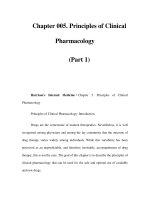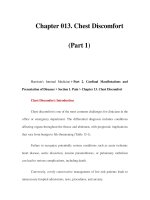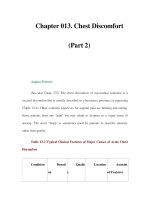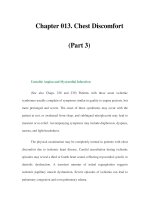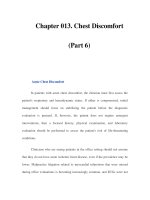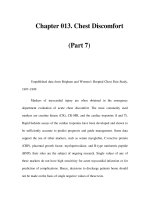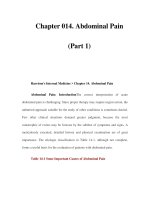Chapter 013. Chest Discomfort (Part 1) pps
Bạn đang xem bản rút gọn của tài liệu. Xem và tải ngay bản đầy đủ của tài liệu tại đây (14.97 KB, 5 trang )
Chapter 013. Chest Discomfort
(Part 1)
Harrison's Internal Medicine > Part 2. Cardinal Manifestations and
Presentation of Diseases > Section 1. Pain > Chapter 13. Chest Discomfort
Chest Discomfort: Introduction
Chest discomfort is one of the most common challenges for clinicians in the
office or emergency department. The differential diagnosis includes conditions
affecting organs throughout the thorax and abdomen, with prognostic implications
that vary from benign to life-threatening (Table 13-1).
Failure to recognize potentially serious conditions such as acute ischemic
heart disease, aortic dissection, tension pneumothorax, or pulmonary embolism
can lead to serious complications, including death.
Conversely, overly conservative management of low-risk patients leads to
unnecessary hospital admissions, tests, procedures, and anxiety.
Table 13-1 Differential Diagnoses of Patients Admitted to Hospital with
Acute Chest Discomfort Ruled Not Myocardial Infarction
Diagnosis Percent
Gastroesophageal disease
a
42
Gastroesophageal reflux
Esophageal motility disorders
Peptic ulcer
Gallstones
Ischemic heart disease 31
Chest wall syndromes 28
Pericarditis
4
Pleuritis/pneumonia
2
Pulmonary embolism
2
Lung cancer
1.5
Aortic aneurysm
1
Aortic stenosis
1
Herpes zoster
1
a
In order of frequency.
Source: P Fruergaard et al: Eur Heart J 17:1028, 1996.
Causes of Chest Discomfort
Myocardial Ischemia and Injury
Myocardial ischemia occurs when the oxygen supply to the heart is not
sufficient to meet metabolic needs. This mismatch can result from a decrease in
oxygen supply, a rise in demand, or both.
The most common underlying cause of myocardial ischemia is obstruction
of coronary arteries by atherosclerosis; in the presence of such obstruction,
transient ischemic episodes are usually precipitated by an increase in oxygen
demand as a result of physical exertion.
However, ischemia can also result from psychological stress, fever, or large
meals or from compromised oxygen delivery due to anemia, hypoxia, or
hypotension.
Ventricular hypertrophy due to valvular heart disease, hypertrophic
cardiomyopathy, or hypertension can predispose the myocardium to ischemia
because of impaired penetration of blood flow from epicardial coronary arteries to
the endocardium.

